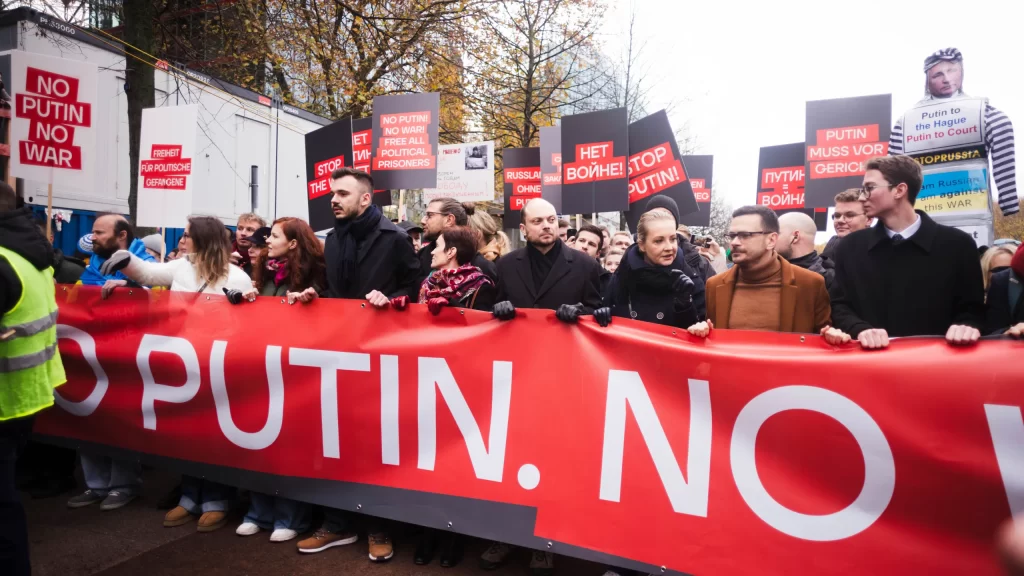Yulia Navalnaya, widow of Russian opposition leader Alexei Navalny, urged thousands of supporters to continue protesting against Russian President Vladimir Putin and the ongoing war in Ukraine during a march in Berlin. “One protest alone won’t change anything. We need to keep coming out,” she said, calling for sustained action in the face of the brutal political climate in Russia.
The protesters, many of whom carried the blue and white Russian opposition flag alongside Ukrainian flags, chanted powerful slogans like “no to war” and “Putin is a killer” in Russian, echoing their condemnation of both the war and the Russian government. For many, the rally symbolized a collective call for change, even as the Russian authorities continue to crack down on dissent, imprisoning hundreds of opposition figures.
The rally, while focused on Russia’s invasion of Ukraine, also demanded three key goals: the immediate withdrawal of Russian troops from Ukraine, the trial of Putin as a “war criminal,” and the release of all political prisoners currently held in Russia.
A Tense Relationship Between Russia’s Opposition and Ukrainians
The war in Ukraine has been a point of contention between Russian opposition figures and some Ukrainian activists. In recent months, Ukrainians have accused the Russian opposition of not doing enough to stop the war or truly acknowledge the suffering caused by the Russian state. Just last week, protesters in Lisbon interrupted a speech by Yulia Navalnaya, playing the sound of air raid sirens to demand that she condemn the war. She did so, but the episode highlighted the complex relationship between Russia’s opposition and Ukrainians affected by the conflict.
Some protesters at the Berlin march seemed eager to address these concerns, though disagreements remained. One marcher said he disagreed with the prominent slogan “Putin = war,” arguing that the invasion was supported by many Russians, not just Putin himself.
Key Figures Speak Out Against Putin’s Regime
Prominent Russian opposition figures, including Oleg Orlov, co-chair of Memorial, the Nobel Peace Prize-winning human rights organization, also participated in the rally. Orlov, who was sentenced to jail in Russia for his anti-war and anti-government views, held a banner that read: “Victory for Ukraine, Defeat for Putin, Freedom for Russia.”
Orlov, who now lives in Germany after being released in a prisoner swap, urged continued support for Ukraine. “Victory for Putin in Ukraine will preserve his fascist regime in Russia for many years,” he warned. “More weapons for Ukraine are crucial, not only for Ukraine’s future but for Russia’s future as well.” He also expressed concern that those in Europe advocating for peace at all costs did not fully understand the long-term consequences of appeasing Putin.
The march ended outside the Russian embassy in Berlin, where the protest leaders climbed onto the back of a truck to thank the crowd for their support. The embassy, once a symbol of Russia’s power, has become a focal point for opposition voices.
Yulia Navalnaya’s Message of Perseverance
Yulia Navalnaya’s call for persistence resonated throughout the event. She reminded the crowd that her late husband, Alexei, had always said protests should be treated like work: consistent and unrelenting. “We need to march repeatedly, not only for ourselves but for those in Russia who cannot protest, for the political prisoners, and for those who have been killed,” she said. Her message was clear: the struggle for change cannot stop, even if it feels like progress is slow.
Voices from Exile
Vladimir Kara-Murza, a prominent Russian opposition figure and critic of the Putin regime, also spoke at the rally. Having spent over two years in jail, including 11 months in solitary confinement, Kara-Murza shared his pride at seeing the crowd, despite its relatively small size. “There are millions in Russia who feel the same way we do, but in Russia, it’s impossible to do what we just did here today,” he said. He described the Russian embassy as a “spy nest” but vowed that one day it would return to being just an embassy.
Among the protesters was Anastasia, a young IT worker from Kazan, Russia, who left her country in March 2022, unable to support the war. “It’s impossible to protest in an authoritarian state,” she explained. “This rally is crucial because we need to show that we are not alone.”
A Sense of Hope Amid Despair
Despite the smaller-than-expected turnout, the protest provided a glimmer of hope for many in the diaspora. One couple told the BBC that the rally made them feel less isolated. “The mood among Russians abroad is bad. People don’t believe in change,” Polina said. “But maybe they’re right. It’s no shame to do a little. It’s a shame to do nothing. That’s what Alexei Navalny once said.”
For many, the rally in Berlin was not just an expression of defiance against Putin but also an affirmation that, even in the face of overwhelming adversity, the fight for justice and political freedom must continue.









